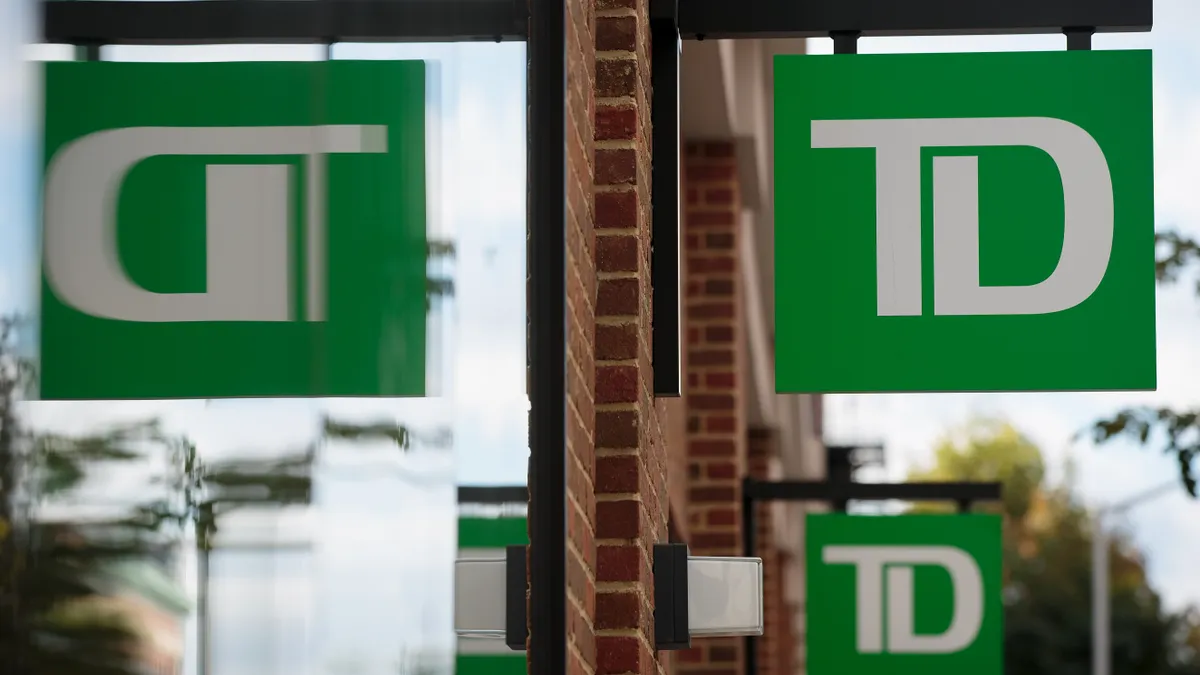TD has told First Horizon it does not expect to receive the regulatory approvals necessary to complete the tie-up between the two banks by May 27, First Horizon said Wednesday in a Securities and Exchange Commission filing.
“TD has initiated discussions with [First Horizon] regarding a potential further extension of the outside date,” the Memphis, Tennessee-based bank said Wednesday. “There can be no assurance that an extension will ultimately be agreed.”
The disclosure comes roughly three weeks after the banks agreed to extend from Feb. 27 the termination date of the $13.4 billion proposed acquisition of First Horizon by Canada’s second-largest lender.
“TD cannot provide a new projected closing date at this time,” First Horizon said Wednesday.
Either bank, per the agreement, may terminate the merger. However, First Horizon stands to risk quite a bit if the deal falls through: It could be forced to pay TD a termination fee of up to $435.5 million under certain circumstances, according to Wednesday’s filing. The agreement also contains provisions that may discourage a new potential acquirer — particularly one willing to pay more than TD — from picking up First Horizon.
Also at risk for the smaller bank, First Horizon sold TD nearly 5,000 shares of preferred stock as part of the anticipated tie-up. If the merger fails to gain regulatory approval, the preferred stock will convert to roughly 19.7 million shares of First Horizon common stock. But that number increases to 27.5 million shares if the deal is terminated for any other reason, according to First Horizon’s filing.
Barclays analyst John Aiken told clients in a note Wednesday that First Horizon’s statement may be a standard disclosure, but “we cannot deny that it brings additional uncertainty in terms of the timing and ultimate completion of the acquisition.”
“The likelihood of the deal not being completed has increased based on this disclosure,” Aiken said, according to Bloomberg.
Since pushing the termination date for the First Horizon deal to May, TD has launched several efforts that may be seen as attempts to sway support for the deal. The Canadian bank unveiled a five-year, $50 billion community benefits plan in which it pledged to open at least 25 new branches and 25 ATMs in low- to moderate-income or majority-nonwhite markets over the next five years. It also vowed to increase residential mortgage loans by 65% for LMI and nonwhite borrowers. Days earlier, TD launched a credit access program geared toward Black entrepreneurs.
Also, in the intervening weeks, TD agreed to pay more than $1.2 billion to avoid a trial related to a Ponzi scheme orchestrated more than a decade ago by disgraced financier R. Allen Stanford.
But TD has also proved it’s not incapable of securing regulators’ sign-off on an acquisition — given the right conditions: The bank announced Friday it had received all of the necessary approvals to complete its $1.3 billion tie-up with Wall Street brokerage Cowen.
The Cowen deal was expected to wrap up Wednesday. TD is due to report quarterly earnings Thursday, meanwhile. And First Horizon’s filing will likely generate questions among analysts listening to TD’s earnings call.
TD CEO Bharat Masrani has been candid on the elusive nature of a green light for the First Horizon deal.
“The final one is the regulatory approvals by the major agencies in the U.S.,” Masrani told analysts in January, according to The Globe and Mail. “That is an unknown. The latest deals seem to take longer than [they] used to.”
Nonetheless, research firm United First Partners said in a note Wednesday it believes TD is “ultimately still committed” to the First Horizon deal.
Approval from the Federal Reserve and the Office of the Comptroller of the Currency “could be further delayed or not obtained at all” due to “an adverse development in either party’s regulatory standing…; governmental, political or community group inquiries, investigations or opposition; or changes in legislation or the political environment generally,” First Horizon said Wednesday.
TD’s community benefits plan may have helped persuade community advocates to allow the deal. But political sign-off is another matter. President Joe Biden in a 2021 executive order, demanded more robust scrutiny of bank combinations. Additionally, Sen. Elizabeth Warren, D-MA, and three members of Congress wrote the OCC in June over concerns that TD incentivized employees to enroll customers in new accounts and services like overdraft protection without their consent.











